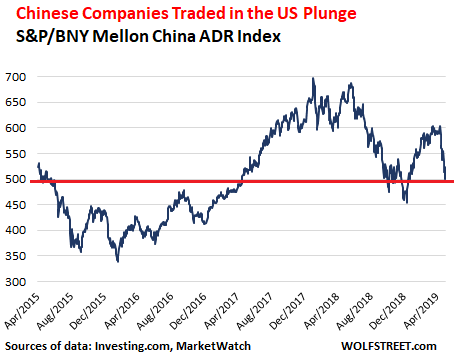Wolf Richter wolfstreet.com, www.amazon.com/author/wolfrichter
Bloodletting after record IPO Hype in 2018 of Chinese companies in the US.
There are about 300 Chinese companies that are traded in the US, either on exchanges or over the counter, either as American Depositary Receipts (ADRs) or as shares. And they’re just about all getting crushed, crushed, crushed.
Even Alibaba, the biggie – which has gotten off easy so far. Its ADRs [BABA] fell again on Friday, closing at $155, having plunged 18% in March so far and 26% from the 52-week high.
Weibo [WB], a social media giant, fell 3.8% on Friday to $43.66 and is now down 69% from its peak in January 2018.
Baidu [BIDU] has plunged 26% over the past six trading days alone to $114.47, and is down 58% from its 52-week high.
JD.com [JD], an online retailer, has plunged 48% from its all-time high in January 2018, to $26.32.
Tencent Holdings, the conglomerate with holdings in social media, payments, video gaming, and tech: Its ADRs [TCEHY] have dropped 25% from the 52-week high and 33% from the peak in January 2018, to $40.86.
Sina Corp [SINA], an internet portal, plunged 5.9% on Friday and 37% so far in May. It’s down 67% from the top of the range it traded at in the January-March period of 2018. The shares have traded in the US since its IPO in March 2000, just as the dotcom bubble was starting to blow up. These shares are now down 70% from their all-time high in 2011.
Then there are the Chinese companies that went public in the US via IPOs in 2018. It was a banner year, in terms of the number of companies: 33, the most ever. They accounted for 17% of all IPOs in the US in 2018. By deal size, 2018 was second largest year: $9.2 billion, behind only 2014, the year of Alibaba’s $25 billion IPO.
Here are the four largest IPOs by Chinese companies in the US in 2018, and to what extent their shares have recently gotten crushed:
#1. iQiyi [IQ], the video streaming company that had been hyped in the US as “China’s answer to Netflix.” It went public at an IPO price of $18 a share, giving it a deal value of $2.4 billion. It had a tumultuous ride, first down into the $14-range, then up to $46.23, and then back down to $18.70 on Friday. It has plunged 19% since May 3, 32% since March 18, and is down 60% from its peak.
#2. Pinduoduo [PDD], the online group discounter. The IPO in July 2018, at a price of $19 a share, gave it a deal value of $1.6 billion. Shares fell to $20.28 on Friday, down 35% from the 52-week high in February.
#3. NIO [NIO], EV maker that had been hyped in the US as the “Tesla of China” at the time of its IPO last October, which was when Tesla traded at around $350 a share, not at $190 as on Friday. The IPO price of $6.25 per ADR made this a $1.15 billion deal. These ADRs fell 1.8% on Friday to $3.86, having plunged 38% below the IPO price, and 72% from the peak of $13.80 at max-hype after the IPO.
#4. Tencent Music Entertainment [TME], the music division of Tencent Holdings, has plunged 28% since April 2. In early December, days before the IPO, the IPO was still hyped as “hotly-anticipated.” But it wasn’t so hot. It took place at $13 per ADR, at the bottom of the range indicated, still extracting $1.1 billion from investors. The ADRs reached a high of $19.11 on March 18 and closed on Friday at $13.62, having plunged 29% from their peak.
There is an index that tracks US-traded ADRs by Chinese companies, the S&P/BNY Mellon China ADR Index. It closed on Friday at 500.1, down 29% from its peak in January 2018, and down 17% so far in May. The index is dominated by Alibaba’s ADRs. Note the plunge in May to below the level where it had been in April 2015 (data via Investing.com, Friday’s closing price via MarketWatch):

Clearly, all the razzmatazz about the US-China trade war, the “new cold war,” the “tech cold war,” and all the global entanglement around Huawei are not helpful. But there is a lot more to it.
SMIC, China’s largest semiconductor maker, said on Friday in a filing to the Hong Kong stock exchange, where its actual shares are listed, that it had notified the NYSE of its intention to apply on June 3 to delist its ADRs that are traded on the NYSE. The delisting is expected to happen after June 13, whereupon the ADRs will trade on the over-the-counter market, it said according to the South China Morning Post.
Upon the news, its ADRs [SMI] fell nearly 5% to $5.24 on Friday. They’d first started trading in the US in early 2004, reaching a high in April that year of $15.60. For buy-and-holders, this has not been a good ride. In the 15 years since that peak, the ADRs have plunged 66%. And they’re down 40% from November 2017.
The company cited low trading volumes of its ADRs and the high costs of maintaining the listing in the US and complying with reporting requirements and related laws in the US, according to the South China Morning Post – and these US reporting requirements and laws are of course precisely what are supposed to provide investors a modicum of protection against the biggest abuses and scams.